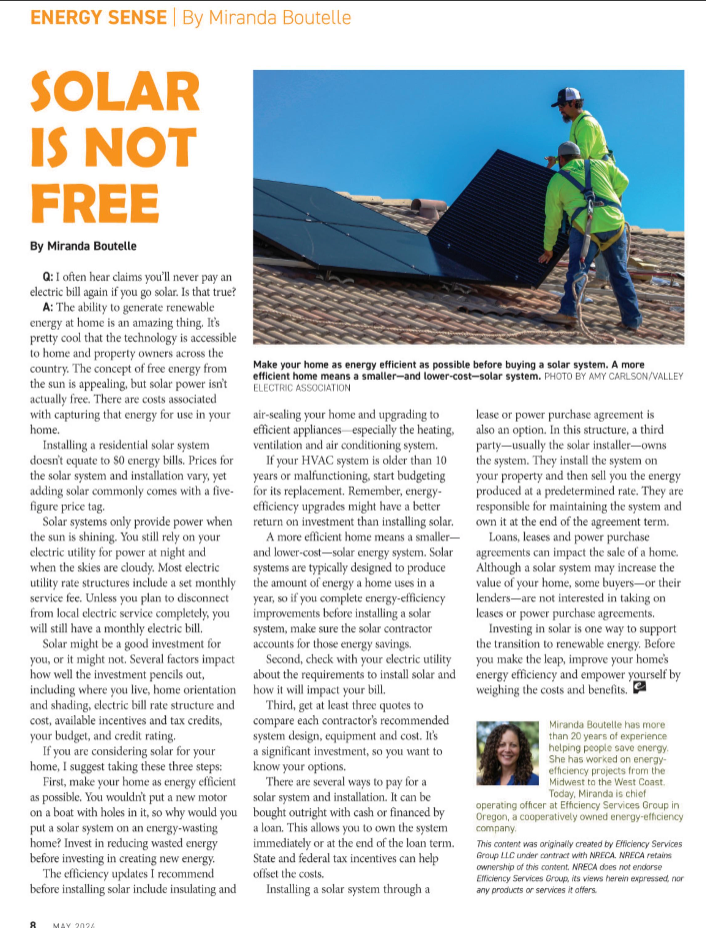Solar is Not Free
Q: I often hear claims you’ll never pay an electric bill again if you go solar. Is that true?
A: The ability to generate your own renewable energy at home is an amazing thing. It’s pretty cool that the technology is accessible to home and property owners across the country. The concept of free energy from the sun is appealing, but solar power isn’t actually free. There are costs associated with capturing that energy for use in your home.
Installing a residential solar system doesn’t equate to $0 energy bills. Prices for the solar system and installation vary, but adding solar typically comes with a five-figure price tag. Solar systems only provide power when the sun is shining. You still rely on your electric utility for power at night and when the skies are cloudy. Most electric utility rate structures include a set monthly service fee. Unless you plan to disconnect from local electric service completely, you will still have a monthly electric bill.
Solar might be a good investment for you, or it might not. Several factors impact how well the investment pencils out, including where you live, home orientation and shading, electric bill rate structure and cost, available incentives and tax credits, your budget and credit rating.
If you are considering solar on your home, I suggest taking these three steps:
First, make your home is as energy efficient as possible. It wouldn’t make sense to put a new motor on a boat with holes in it, so why would you put a solar system on an energy-wasting home? Invest in reducing wasted energy before investing in creating new energy. The efficiency updates I recommend before installing solar include insulating and air sealing your home and upgrading to efficient appliances—especially the heating, ventilation and air conditioning system.
If your HVAC system is older than 10 years or malfunctioning, make sure replacing it is in the budget. Remember, energy efficiency upgrades might have a better return on investment than installing solar.
A more efficient home means a smaller—and lower-cost—solar energy system. Solar systems are typically designed to produce the amount of energy a home uses in a year, so if you complete energy efficiency improvements before installing a solar system, make sure the solar contractor accounts for those energy savings.
Second, check with your electric utility about the requirements to install solar and how it will impact your bill. If you decide to install solar panels, working with your utility will be essential, as you will need to take important steps, such as signing an interconnection agreement to ensure the system is properly connected to the electric grid.
Third, get at least three quotes to compare each contractor’s recommended system design, equipment and cost. It’s a significant investment, so you want to know your options.
There are several ways to pay for a solar system and installation. It can be bought outright with cash or financed by a loan. This allows you to own the system immediately or at the end of the loan term. State and federal tax incentives can help offset the costs.
There is also the option to install a solar system through a lease or power purchase agreement. In this structure, a third party—usually the solar installer—owns the system. They install the system on your property and then sell you the energy produced at a predetermined rate. They are responsible for maintaining the system and own it at the end of the agreement term.
Loans, leases and power purchase agreements can impact the sale of a home. Although a solar system may increase the value of your home, some buyers—or their lenders—are not interested in taking on leases or power purchase agreements.
Investing in solar is one way to support the transition to renewable energy. Before you make the leap, improve your home’s energy efficiency and empower yourself by thoroughly weighing the costs and benefits.


